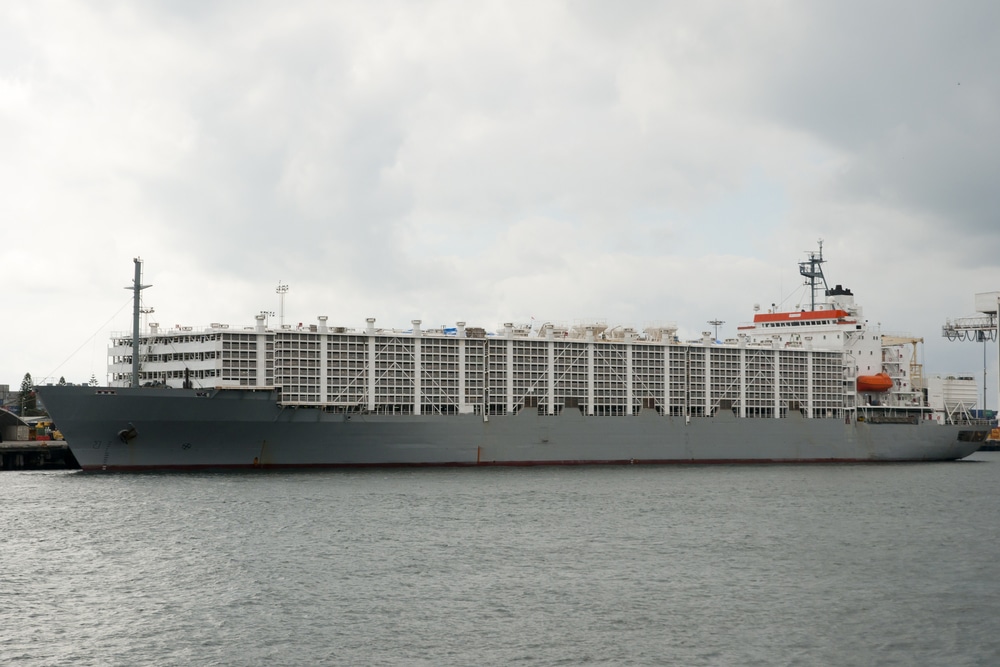
The maritime industry is reeling after a livestock ship sank off the coast of Japan last week. The ship was carrying around 6,000 head of cattle. All of the cattle and 42 maritime workers are still missing in the storm-tossed waters.
Just days earlier, Typhoon Maysak hit the area causing rough seas and intense weather conditions. Officials believe that this could be the cause of the vessel sinking. The investigation into this tragic maritime accident is ongoing.
Livestock Ship Sinks, Maritime Workers Missing
According to reports, there were 43 maritime workers onboard the Gulf Livestock 1 ship. The ship was enroute from New Zealand to China with the full load of cattle. On September 2, a distress call went out from just west of Amami Oshima island, off the coast of Japan. The Japanese coast guard responded to the scene and located one survivor.
Officials say that 39 of the maritime workers are from the Philippines, two are from New Zealand and one is a veterinarian from Australia. The lone survivor is the chief officer, a 45-year-old maritime worker from the Philippines. He told officials that the ship lost an engine and then capsized after a wave hit the ship broadside. The crew was ordered to put on life jackets.
The survivor said that when we abandoned ship he did not see any fellow crew members. He also did not see any other survivors in the water after the ship disappeared. No wreckage has been found so far, but the search is ongoing.
Following the sinking, New Zealand’s Ministry for Primary Industries temporarily suspended cattle export applications. Officials say that they want to investigate what happened on the Gulf Livestock 1 before other maritime workers embark on similar voyages.
Data Suggests Numerous Livestock Ship Incidents
Data suggests that livestock ship incidents like the Gulf Livestock 1 sinking are not terribly uncommon. Over the past several years, several livestock ship accidents have resulted in tens of thousands of animals being lost. Some notable examples include:
- In 2019, a livestock carrier with more than 14,000 sheep on board capsized after experiencing “maneuvering issues.” Only a few hundred of the sheep were rescued.
- At least 3,000 sheep died in 2016 in another maritime accident when the livestock ship caught fire and sank off the coast of Somalia.
- In 2015, a ship carrying 5,000 cattle sank while still tied up at port in Brazil. Almost all of the cattle drowned.
- In 2009, a ship off the coast of Lebanon lost power and sank. Forty-four of the 83 maritime workers on board died. More than 10,000 sheep and 17,000 cattle also died.
- In 1996, around 67,000 sheep died on a livestock ship after it caught fire and was abandoned. One maritime worker died in this incident, which happened off the coast of the Seychelles.
- In 1991, 10,000 sheep died on a livestock ship after a mechanical ventilation failure during a trip from New Zealand to the Middle East.
These examples are just some of the notable cases that have made news headlines. There are certainly many other maritime incidents that are not as highly publicized. They are equally tragic, however.
These examples also show the wide range of problems that can lead to maritime accidents, including ships sinking.
Most Common Reasons Why Ships Sink
Vessel sinkings can happen for numerous reasons. Some are unpredictable and others are the result of human error. The most common reasons why ships sink include:
- Treacherous weather conditions
- Failure of the captain or crew to heed weather warnings
- Fires or explosions on the ship
- Improperly loaded or secured cargo
- Failure to make repairs to the ship before launching
- Failure of watertight covers, doors or holds
- Navigational mistakes
- Steering mistakes
- Improperly trained maritime workers
Ship owners and operators must follow strict guidelines and regulations when they transport cargo. If an owner or operator fails to follow guidelines and regulations, then they can be held liable if maritime workers are injured or killed while on board the ship.
Of course, some maritime accidents are purely unpredictable and unavoidable. But some of them can be prevented by the owner, operator and crew doing their part to follow guidelines and safety procedures.
What Maritime Workers Can Do about Injuries
If you are a maritime worker and you have injuries from an accident while on board a ship, your best course of action is to contact a maritime injury lawyer. Maritime workers have certain legal rights, and there are certain benefits that you may qualify for. These benefits could help you recover the cost of your medical care and could supplement your income while you heal.
At Maritime Injury Guide, our goal is to make sure that injured maritime workers get the benefits that they deserve. If you are injured, give us a call to learn more about your options. For a free injury consultation, call us at 1-866-871-8422. You can also reach us through email by completing our confidential contact form.
Sources:
https://splash247.com/live-animal-export-loaded-sheep-ship-capsizes-13567-sheep-drown/